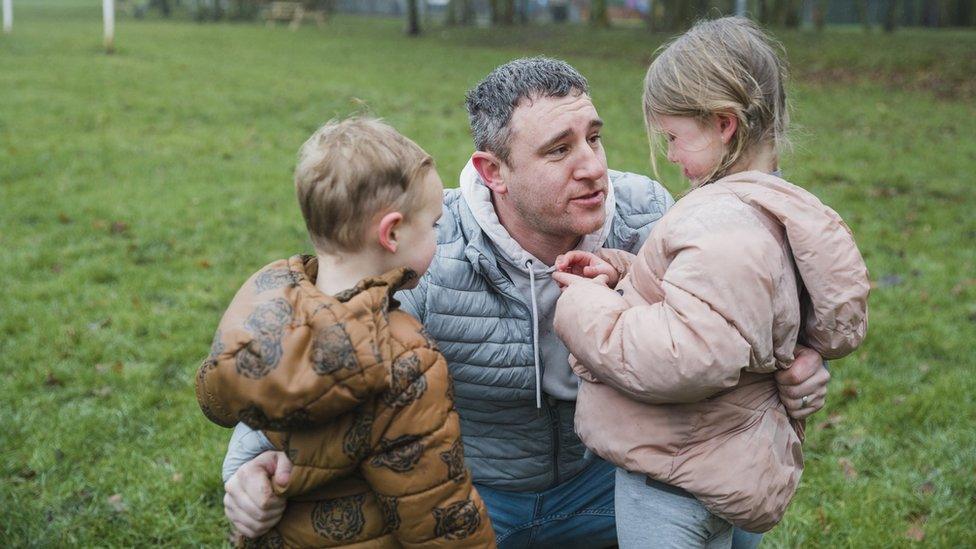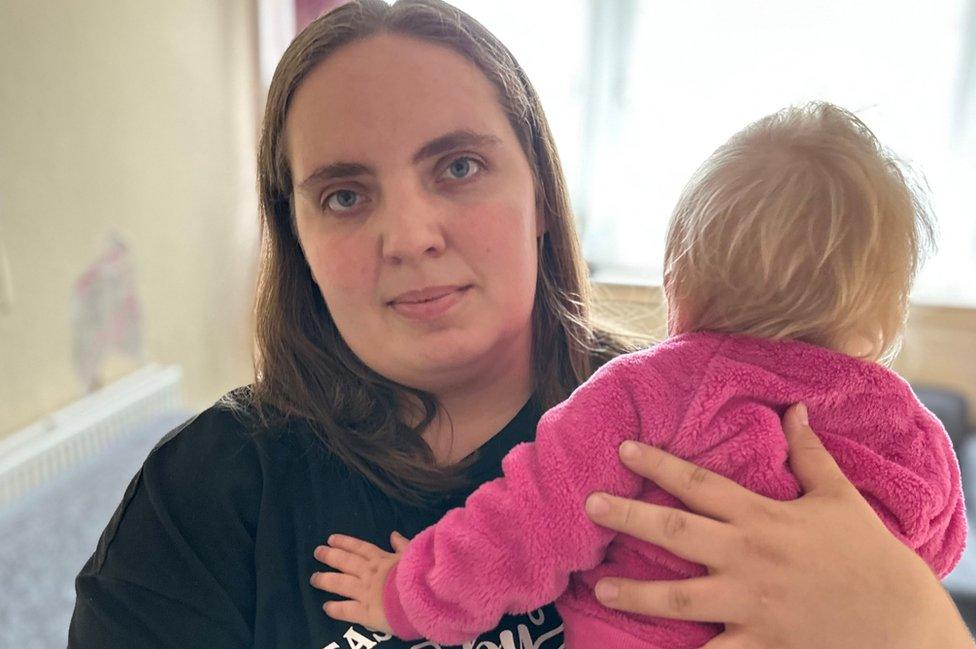Child homelessness in Scotland hits new record high
- Published

A record number of households with children are living in temporary accommodation
More children than ever are homeless and living in temporary accommodation in Scotland, official figures show, external.
As of March this year, 9,595 youngsters were in the system - the highest since Scottish government records began in 2002.
In total, there were 29,652 open homelessness cases in March, which was a 15% rise on last year.
The Scottish government described the situation as ""deeply worrying".
Meanwhile, homelessness applications increased by 9% in 2022-23 while there was a 1% drop in cases being closed.
More households reported rough sleeping - 1,500 the night before (up 4%) and 2,438 (up 6%) in the three months before a homelessness application.
However, there were fewer households being made homeless from private rented accommodation following an emergency rent freeze as part of cost of living legislation introduced in October 2022.
Housing minister Paul McLennan said: "Tackling homelessness is a key priority and it is critical that local government and other partners work with us to reach our shared goal of reversing these figures and delivering on our long-term strategy for tackling homelessness."
'Strongest rights'
He added: "I am very disappointed by the high number of people, including many children, who were living in temporary accommodation in March 2023.
"Scotland has the strongest rights across the UK nations for people experiencing homelessness and - whilst it shows our legislation is working to make sure people are not roofless and provided with a home - temporary accommodation should be just that, temporary."
In the cases assessed:
62% of people were aged 25 to 49
66% of households were a single person
29% contained children
84% of people were of white ethnicity
51% had at least one support need
The Scottish Conservatives said the latest figures "should be a source of shame for the SNP-Green government".
The party's housing spokesman Miles Briggs said: "They are presiding over an ever-increasing homelessness crisis in Scotland, but are failing to take any meaningful action to tackle it.
"It is disgraceful that the number of children living in temporary accommodation has reached a record high.
"Nobody - but particularly our young people - should be spending an increasing amount of time without a permanent place to call home."
Scottish Labour's Mark Griffin said the Holyrood and Westminster governments "should hang their heads in shame at the scale of this crisis".
He added: "Tory economic chaos and SNP inaction means Scotland's homelessness crisis has spiralled out of control - and it is our most vulnerable who are paying the price.
"Action needs to be taken now to tackle this crisis, build the homes people need and deliver the long-term support to people facing homelessness."

'This isn't a home'

Egle Bouri lives with her four children in temporary accommodation
"It's a constant limbo," says Egle Bouri, 29.
"The hardest part is not knowing. For example, if I knew I will move on a certain date, I could plan for it.
"But at the moment, it's like we are stuck."
Egle lives with her four children - aged 18 months to seven years old - in temporary accommodation in Glasgow.
Born in Lithuania, she moved to Scotland when she was 18 and had a family.
She had her own social tenancy but a relationship breakdown led her to making a homelessness application in October 2021.
Since then, she has been placed in emergency accommodation by the council while she waits for a new permanent home.
For now, she lives in three-bedroom basement property in Springburn, where she has stayed for over a year.
When BBC Scotland News visited the property, she showed us peeling wallpaper, broken sockets and a catalogue of repair jobs waiting to be done.
The family's belongings are still in boxes as they wait for an offer on a house.
Egle said "I would like to decorate the rooms but it is so temporary.
"I don't think this is a home… It's a house. We try to make it home but it will never be home."
She added: "I appreciate that I have a roof over my head. It is better than living in a hostel.
"But that doesn't change the fact that it's not a great place."

The Scottish Federation of Housing Associations said the right to live in a safe, warm, affordable home was "just not the reality in Scotland".
Chief executive officer Sally Thomas said: "We are working with Scottish government to try to find ways of getting people into permanent accommodation more quickly.
"However, fundamentally, this is a problem of supply. Scotland is not on track to deliver the target of 110,000 affordable homes by 2032, and urgent, significant action is needed.
"Furthermore, we must remain focused on preventing homelessness through early intervention and prevention, working with and across all levels of government to make sure people have a home, as well as any specific support they might need to sustain it."
Homelessness charities blamed Scottish and UK government "inaction" for the record rise.
'Risk of catastrophe'
Crisis chief executive Matt Downie said: "This was already an emergency, but we are now at risk of a growing catastrophe.
"The Scottish government must push on with plans to prevent homelessness, so people can get help earlier and so public services help stop people being forced from their homes.
"The UK government must urgently invest in housing benefit, to avert more people being pushed into homelessness."
Shelter Scotland's assistant director Gordon MacRae said: "For decades social housing has been neglected and this is the result; more than 16,000 children in Scotland became homeless this year, many of them spending years stuck in miserable temporary accommodation.
"It is utterly shameful.
"The first minister has repeatedly said that his mission in government is to end poverty, child poverty especially, in Scotland. There can be no hope whatsoever of achieving that aim unless he and his ministers commit to serious investment in delivering social homes."


Local authorities in Scotland have a legal duty to provide temporary accommodation to households made unintentionally homeless.
Legislation offers strong protections against families ending up on the streets.
This is the reason why rough sleeping - despite rising figures in the cities - is just a small fraction of the overall homeless figures and still below pre-pandemic levels.
But there is now a bottleneck - more families than ever are stuck in the limbo of temporary accommodation while councils struggle to find suitable homes.
At the same time, waiting times are growing and the number of homeless cases being resolved are falling.
From the Right to Buy council homes in the 1980s to missed housing targets in more recent years, charities and campaigners say this has been the result of decades of under-investment in social housing.
They are calling for increased investment to build more affordable homes.